Online Privacy Essay - NIT2201, IT Profession & Ethics, Assignment 1
VerifiedAdded on 2022/08/27
|9
|2330
|17
Essay
AI Summary
This essay delves into the multifaceted realm of online privacy, examining the critical issues surrounding digital materials and the potential threats to personal information. It begins by defining online privacy and highlighting its importance in safeguarding sensitive data from theft and misuse. The essay then explores the key concerns associated with digital privacy, including media failures, rapid technological changes, and the pervasive issue of spying and snooping through online trackers. Information misleading, a significant issue, is also discussed with examples of real-world cases of data breaches. The essay then proposes various options to ensure digital privacy, such as enabling private browsing, creating strong passwords, and utilizing two-factor authentication. It also examines the role of data encryption, backups, and anti-malware protection. The essay further discusses Australia's digital privacy laws and legislations, including the role of the Australian Information Commissioner and the proposed new cyber legislature. The essay concludes by presenting case studies of Uber Technologies, Lenovo, and Vizio, highlighting the consequences of privacy violations and emphasizing the need for user awareness, shared accountability, and government support for privacy education. The essay also provides a comparative analysis of online privacy laws in the European Union and Australia, highlighting similarities and differences in their approaches. The essay emphasizes the importance of digital privacy for the users and service providers to safeguard the personal information.
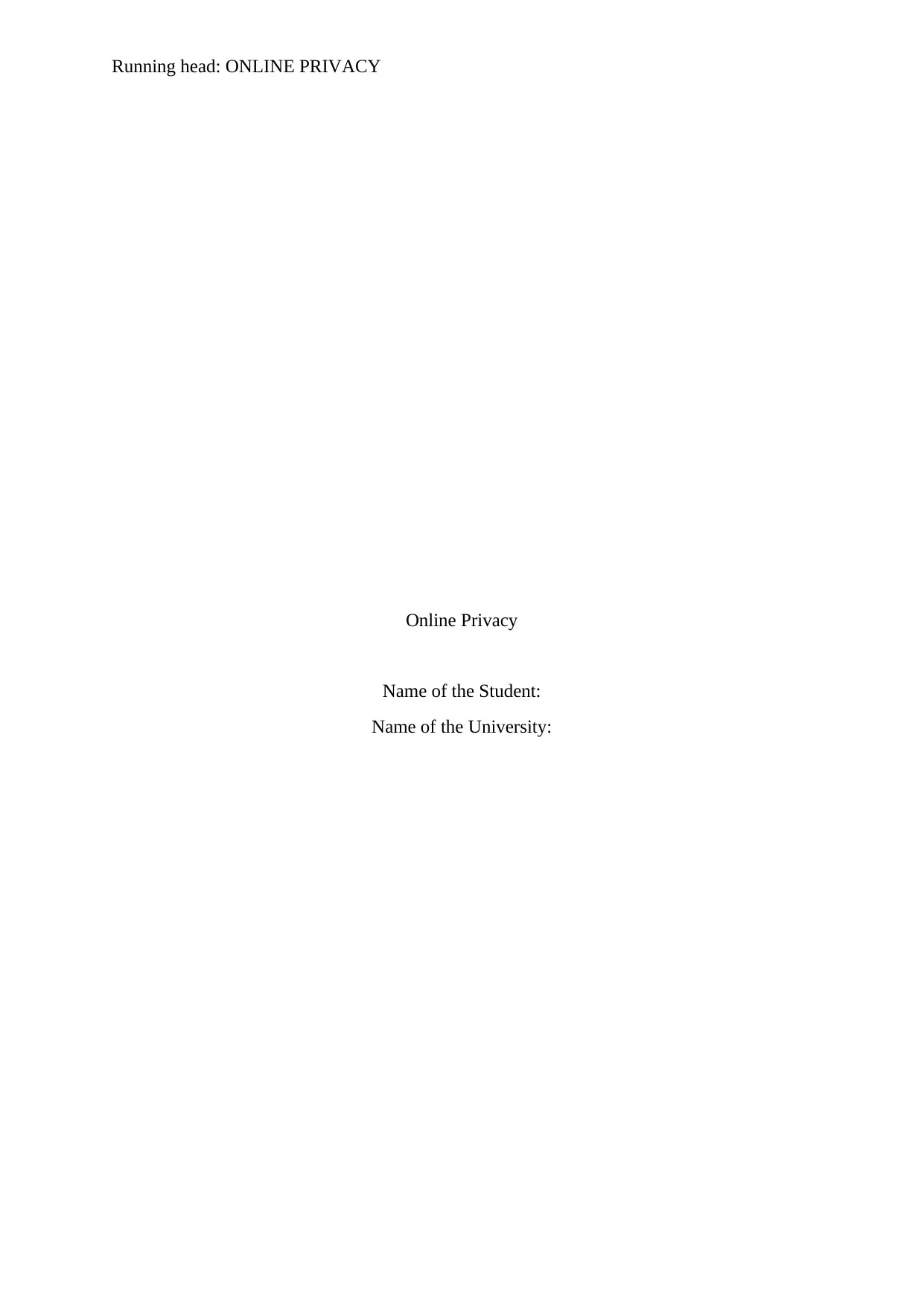
Running head: ONLINE PRIVACY
Online Privacy
Name of the Student:
Name of the University:
Online Privacy
Name of the Student:
Name of the University:
Paraphrase This Document
Need a fresh take? Get an instant paraphrase of this document with our AI Paraphraser
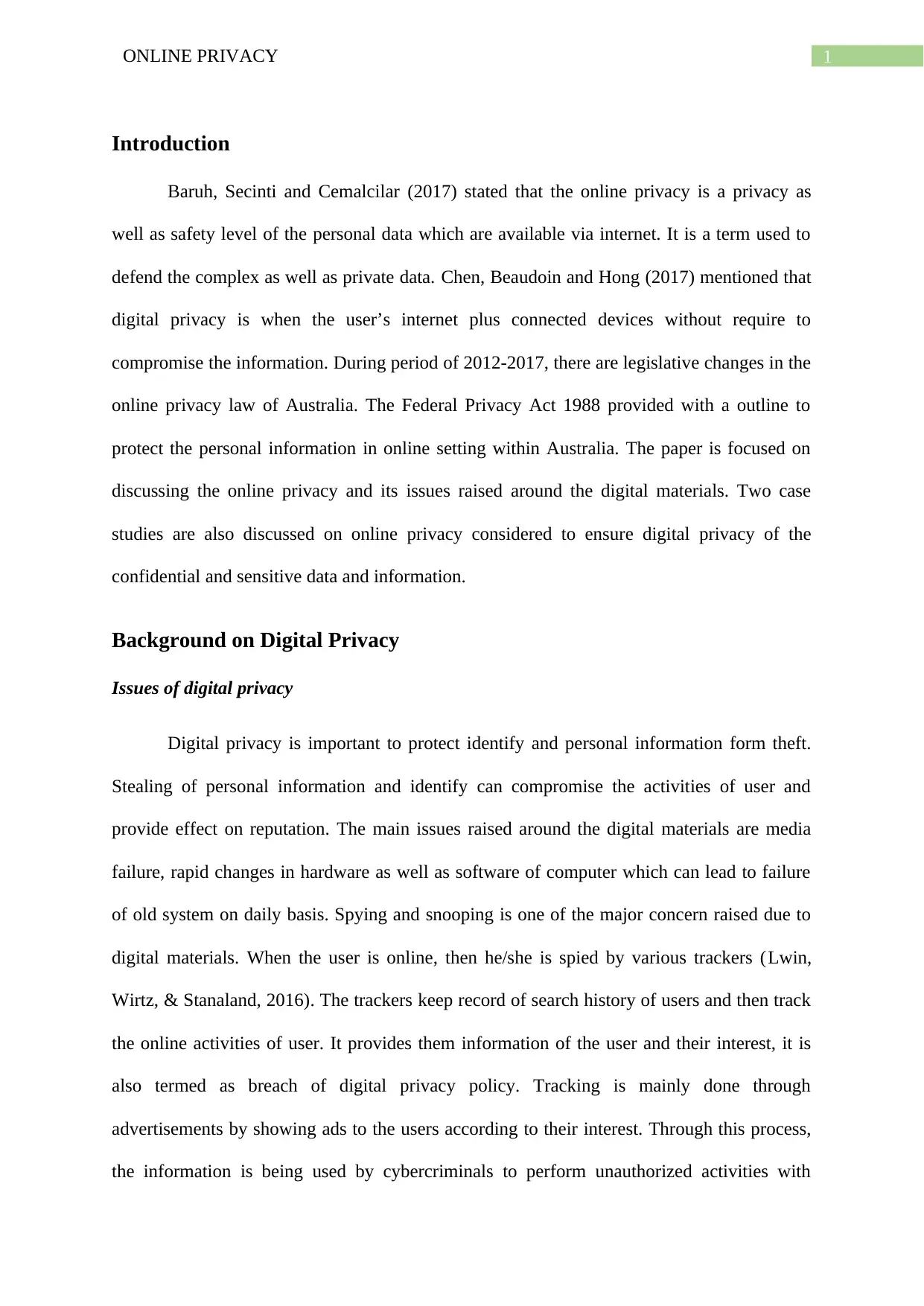
1ONLINE PRIVACY
Introduction
Baruh, Secinti and Cemalcilar (2017) stated that the online privacy is a privacy as
well as safety level of the personal data which are available via internet. It is a term used to
defend the complex as well as private data. Chen, Beaudoin and Hong (2017) mentioned that
digital privacy is when the user’s internet plus connected devices without require to
compromise the information. During period of 2012-2017, there are legislative changes in the
online privacy law of Australia. The Federal Privacy Act 1988 provided with a outline to
protect the personal information in online setting within Australia. The paper is focused on
discussing the online privacy and its issues raised around the digital materials. Two case
studies are also discussed on online privacy considered to ensure digital privacy of the
confidential and sensitive data and information.
Background on Digital Privacy
Issues of digital privacy
Digital privacy is important to protect identify and personal information form theft.
Stealing of personal information and identify can compromise the activities of user and
provide effect on reputation. The main issues raised around the digital materials are media
failure, rapid changes in hardware as well as software of computer which can lead to failure
of old system on daily basis. Spying and snooping is one of the major concern raised due to
digital materials. When the user is online, then he/she is spied by various trackers (Lwin,
Wirtz, & Stanaland, 2016). The trackers keep record of search history of users and then track
the online activities of user. It provides them information of the user and their interest, it is
also termed as breach of digital privacy policy. Tracking is mainly done through
advertisements by showing ads to the users according to their interest. Through this process,
the information is being used by cybercriminals to perform unauthorized activities with
Introduction
Baruh, Secinti and Cemalcilar (2017) stated that the online privacy is a privacy as
well as safety level of the personal data which are available via internet. It is a term used to
defend the complex as well as private data. Chen, Beaudoin and Hong (2017) mentioned that
digital privacy is when the user’s internet plus connected devices without require to
compromise the information. During period of 2012-2017, there are legislative changes in the
online privacy law of Australia. The Federal Privacy Act 1988 provided with a outline to
protect the personal information in online setting within Australia. The paper is focused on
discussing the online privacy and its issues raised around the digital materials. Two case
studies are also discussed on online privacy considered to ensure digital privacy of the
confidential and sensitive data and information.
Background on Digital Privacy
Issues of digital privacy
Digital privacy is important to protect identify and personal information form theft.
Stealing of personal information and identify can compromise the activities of user and
provide effect on reputation. The main issues raised around the digital materials are media
failure, rapid changes in hardware as well as software of computer which can lead to failure
of old system on daily basis. Spying and snooping is one of the major concern raised due to
digital materials. When the user is online, then he/she is spied by various trackers (Lwin,
Wirtz, & Stanaland, 2016). The trackers keep record of search history of users and then track
the online activities of user. It provides them information of the user and their interest, it is
also termed as breach of digital privacy policy. Tracking is mainly done through
advertisements by showing ads to the users according to their interest. Through this process,
the information is being used by cybercriminals to perform unauthorized activities with
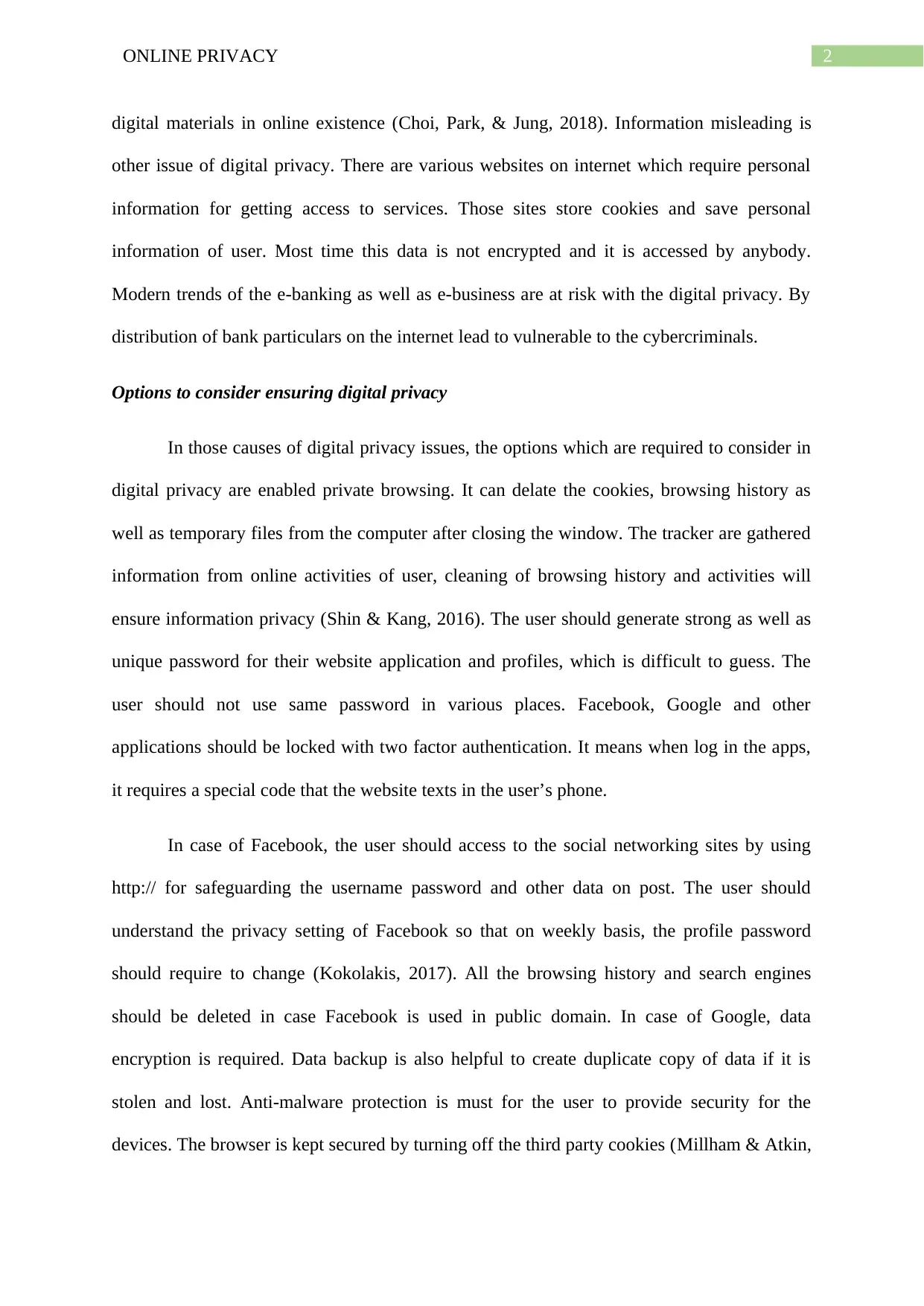
2ONLINE PRIVACY
digital materials in online existence (Choi, Park, & Jung, 2018). Information misleading is
other issue of digital privacy. There are various websites on internet which require personal
information for getting access to services. Those sites store cookies and save personal
information of user. Most time this data is not encrypted and it is accessed by anybody.
Modern trends of the e-banking as well as e-business are at risk with the digital privacy. By
distribution of bank particulars on the internet lead to vulnerable to the cybercriminals.
Options to consider ensuring digital privacy
In those causes of digital privacy issues, the options which are required to consider in
digital privacy are enabled private browsing. It can delate the cookies, browsing history as
well as temporary files from the computer after closing the window. The tracker are gathered
information from online activities of user, cleaning of browsing history and activities will
ensure information privacy (Shin & Kang, 2016). The user should generate strong as well as
unique password for their website application and profiles, which is difficult to guess. The
user should not use same password in various places. Facebook, Google and other
applications should be locked with two factor authentication. It means when log in the apps,
it requires a special code that the website texts in the user’s phone.
In case of Facebook, the user should access to the social networking sites by using
http:// for safeguarding the username password and other data on post. The user should
understand the privacy setting of Facebook so that on weekly basis, the profile password
should require to change (Kokolakis, 2017). All the browsing history and search engines
should be deleted in case Facebook is used in public domain. In case of Google, data
encryption is required. Data backup is also helpful to create duplicate copy of data if it is
stolen and lost. Anti-malware protection is must for the user to provide security for the
devices. The browser is kept secured by turning off the third party cookies (Millham & Atkin,
digital materials in online existence (Choi, Park, & Jung, 2018). Information misleading is
other issue of digital privacy. There are various websites on internet which require personal
information for getting access to services. Those sites store cookies and save personal
information of user. Most time this data is not encrypted and it is accessed by anybody.
Modern trends of the e-banking as well as e-business are at risk with the digital privacy. By
distribution of bank particulars on the internet lead to vulnerable to the cybercriminals.
Options to consider ensuring digital privacy
In those causes of digital privacy issues, the options which are required to consider in
digital privacy are enabled private browsing. It can delate the cookies, browsing history as
well as temporary files from the computer after closing the window. The tracker are gathered
information from online activities of user, cleaning of browsing history and activities will
ensure information privacy (Shin & Kang, 2016). The user should generate strong as well as
unique password for their website application and profiles, which is difficult to guess. The
user should not use same password in various places. Facebook, Google and other
applications should be locked with two factor authentication. It means when log in the apps,
it requires a special code that the website texts in the user’s phone.
In case of Facebook, the user should access to the social networking sites by using
http:// for safeguarding the username password and other data on post. The user should
understand the privacy setting of Facebook so that on weekly basis, the profile password
should require to change (Kokolakis, 2017). All the browsing history and search engines
should be deleted in case Facebook is used in public domain. In case of Google, data
encryption is required. Data backup is also helpful to create duplicate copy of data if it is
stolen and lost. Anti-malware protection is must for the user to provide security for the
devices. The browser is kept secured by turning off the third party cookies (Millham & Atkin,
⊘ This is a preview!⊘
Do you want full access?
Subscribe today to unlock all pages.

Trusted by 1+ million students worldwide
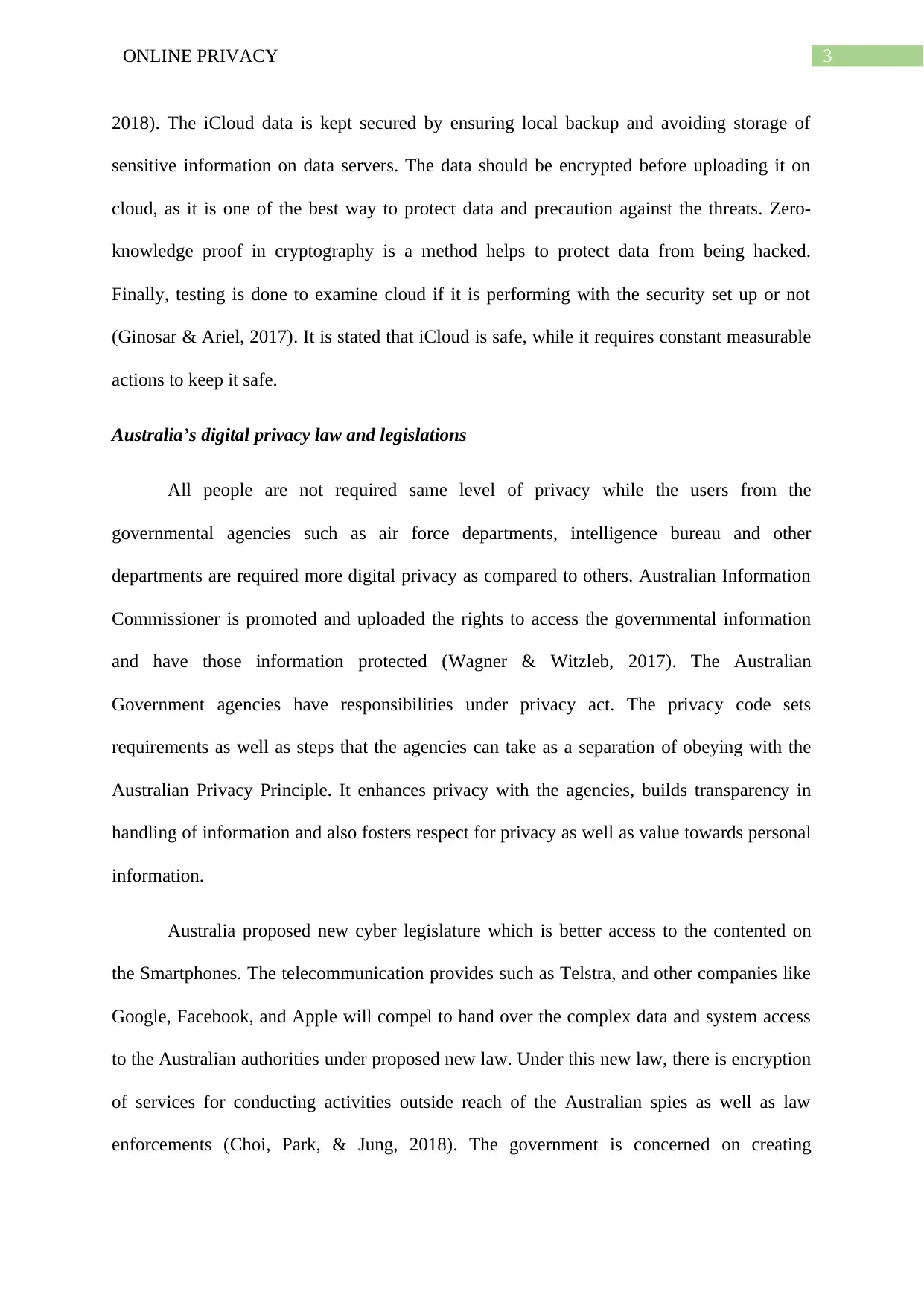
3ONLINE PRIVACY
2018). The iCloud data is kept secured by ensuring local backup and avoiding storage of
sensitive information on data servers. The data should be encrypted before uploading it on
cloud, as it is one of the best way to protect data and precaution against the threats. Zero-
knowledge proof in cryptography is a method helps to protect data from being hacked.
Finally, testing is done to examine cloud if it is performing with the security set up or not
(Ginosar & Ariel, 2017). It is stated that iCloud is safe, while it requires constant measurable
actions to keep it safe.
Australia’s digital privacy law and legislations
All people are not required same level of privacy while the users from the
governmental agencies such as air force departments, intelligence bureau and other
departments are required more digital privacy as compared to others. Australian Information
Commissioner is promoted and uploaded the rights to access the governmental information
and have those information protected (Wagner & Witzleb, 2017). The Australian
Government agencies have responsibilities under privacy act. The privacy code sets
requirements as well as steps that the agencies can take as a separation of obeying with the
Australian Privacy Principle. It enhances privacy with the agencies, builds transparency in
handling of information and also fosters respect for privacy as well as value towards personal
information.
Australia proposed new cyber legislature which is better access to the contented on
the Smartphones. The telecommunication provides such as Telstra, and other companies like
Google, Facebook, and Apple will compel to hand over the complex data and system access
to the Australian authorities under proposed new law. Under this new law, there is encryption
of services for conducting activities outside reach of the Australian spies as well as law
enforcements (Choi, Park, & Jung, 2018). The government is concerned on creating
2018). The iCloud data is kept secured by ensuring local backup and avoiding storage of
sensitive information on data servers. The data should be encrypted before uploading it on
cloud, as it is one of the best way to protect data and precaution against the threats. Zero-
knowledge proof in cryptography is a method helps to protect data from being hacked.
Finally, testing is done to examine cloud if it is performing with the security set up or not
(Ginosar & Ariel, 2017). It is stated that iCloud is safe, while it requires constant measurable
actions to keep it safe.
Australia’s digital privacy law and legislations
All people are not required same level of privacy while the users from the
governmental agencies such as air force departments, intelligence bureau and other
departments are required more digital privacy as compared to others. Australian Information
Commissioner is promoted and uploaded the rights to access the governmental information
and have those information protected (Wagner & Witzleb, 2017). The Australian
Government agencies have responsibilities under privacy act. The privacy code sets
requirements as well as steps that the agencies can take as a separation of obeying with the
Australian Privacy Principle. It enhances privacy with the agencies, builds transparency in
handling of information and also fosters respect for privacy as well as value towards personal
information.
Australia proposed new cyber legislature which is better access to the contented on
the Smartphones. The telecommunication provides such as Telstra, and other companies like
Google, Facebook, and Apple will compel to hand over the complex data and system access
to the Australian authorities under proposed new law. Under this new law, there is encryption
of services for conducting activities outside reach of the Australian spies as well as law
enforcements (Choi, Park, & Jung, 2018). The government is concerned on creating
Paraphrase This Document
Need a fresh take? Get an instant paraphrase of this document with our AI Paraphraser
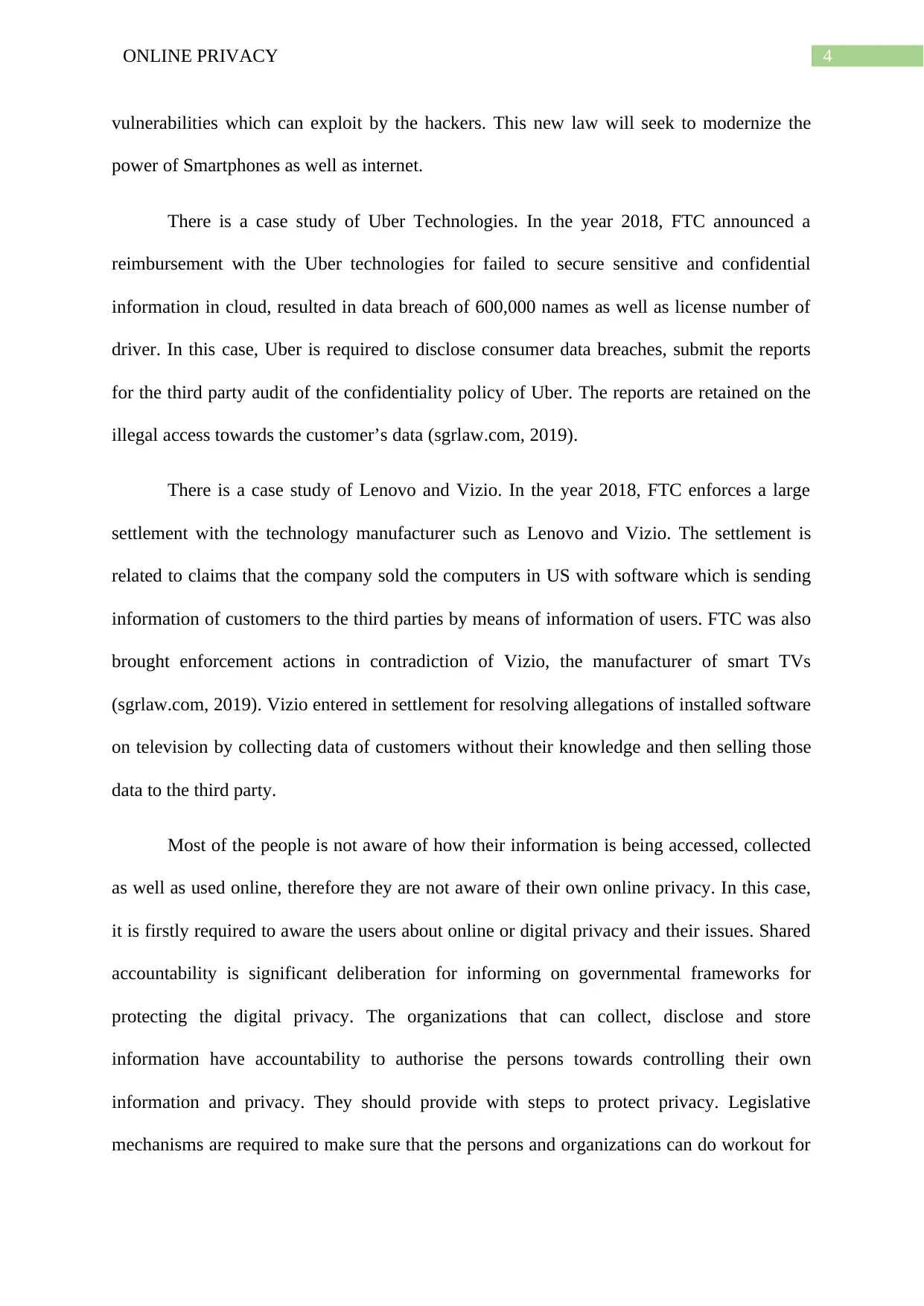
4ONLINE PRIVACY
vulnerabilities which can exploit by the hackers. This new law will seek to modernize the
power of Smartphones as well as internet.
There is a case study of Uber Technologies. In the year 2018, FTC announced a
reimbursement with the Uber technologies for failed to secure sensitive and confidential
information in cloud, resulted in data breach of 600,000 names as well as license number of
driver. In this case, Uber is required to disclose consumer data breaches, submit the reports
for the third party audit of the confidentiality policy of Uber. The reports are retained on the
illegal access towards the customer’s data (sgrlaw.com, 2019).
There is a case study of Lenovo and Vizio. In the year 2018, FTC enforces a large
settlement with the technology manufacturer such as Lenovo and Vizio. The settlement is
related to claims that the company sold the computers in US with software which is sending
information of customers to the third parties by means of information of users. FTC was also
brought enforcement actions in contradiction of Vizio, the manufacturer of smart TVs
(sgrlaw.com, 2019). Vizio entered in settlement for resolving allegations of installed software
on television by collecting data of customers without their knowledge and then selling those
data to the third party.
Most of the people is not aware of how their information is being accessed, collected
as well as used online, therefore they are not aware of their own online privacy. In this case,
it is firstly required to aware the users about online or digital privacy and their issues. Shared
accountability is significant deliberation for informing on governmental frameworks for
protecting the digital privacy. The organizations that can collect, disclose and store
information have accountability to authorise the persons towards controlling their own
information and privacy. They should provide with steps to protect privacy. Legislative
mechanisms are required to make sure that the persons and organizations can do workout for
vulnerabilities which can exploit by the hackers. This new law will seek to modernize the
power of Smartphones as well as internet.
There is a case study of Uber Technologies. In the year 2018, FTC announced a
reimbursement with the Uber technologies for failed to secure sensitive and confidential
information in cloud, resulted in data breach of 600,000 names as well as license number of
driver. In this case, Uber is required to disclose consumer data breaches, submit the reports
for the third party audit of the confidentiality policy of Uber. The reports are retained on the
illegal access towards the customer’s data (sgrlaw.com, 2019).
There is a case study of Lenovo and Vizio. In the year 2018, FTC enforces a large
settlement with the technology manufacturer such as Lenovo and Vizio. The settlement is
related to claims that the company sold the computers in US with software which is sending
information of customers to the third parties by means of information of users. FTC was also
brought enforcement actions in contradiction of Vizio, the manufacturer of smart TVs
(sgrlaw.com, 2019). Vizio entered in settlement for resolving allegations of installed software
on television by collecting data of customers without their knowledge and then selling those
data to the third party.
Most of the people is not aware of how their information is being accessed, collected
as well as used online, therefore they are not aware of their own online privacy. In this case,
it is firstly required to aware the users about online or digital privacy and their issues. Shared
accountability is significant deliberation for informing on governmental frameworks for
protecting the digital privacy. The organizations that can collect, disclose and store
information have accountability to authorise the persons towards controlling their own
information and privacy. They should provide with steps to protect privacy. Legislative
mechanisms are required to make sure that the persons and organizations can do workout for
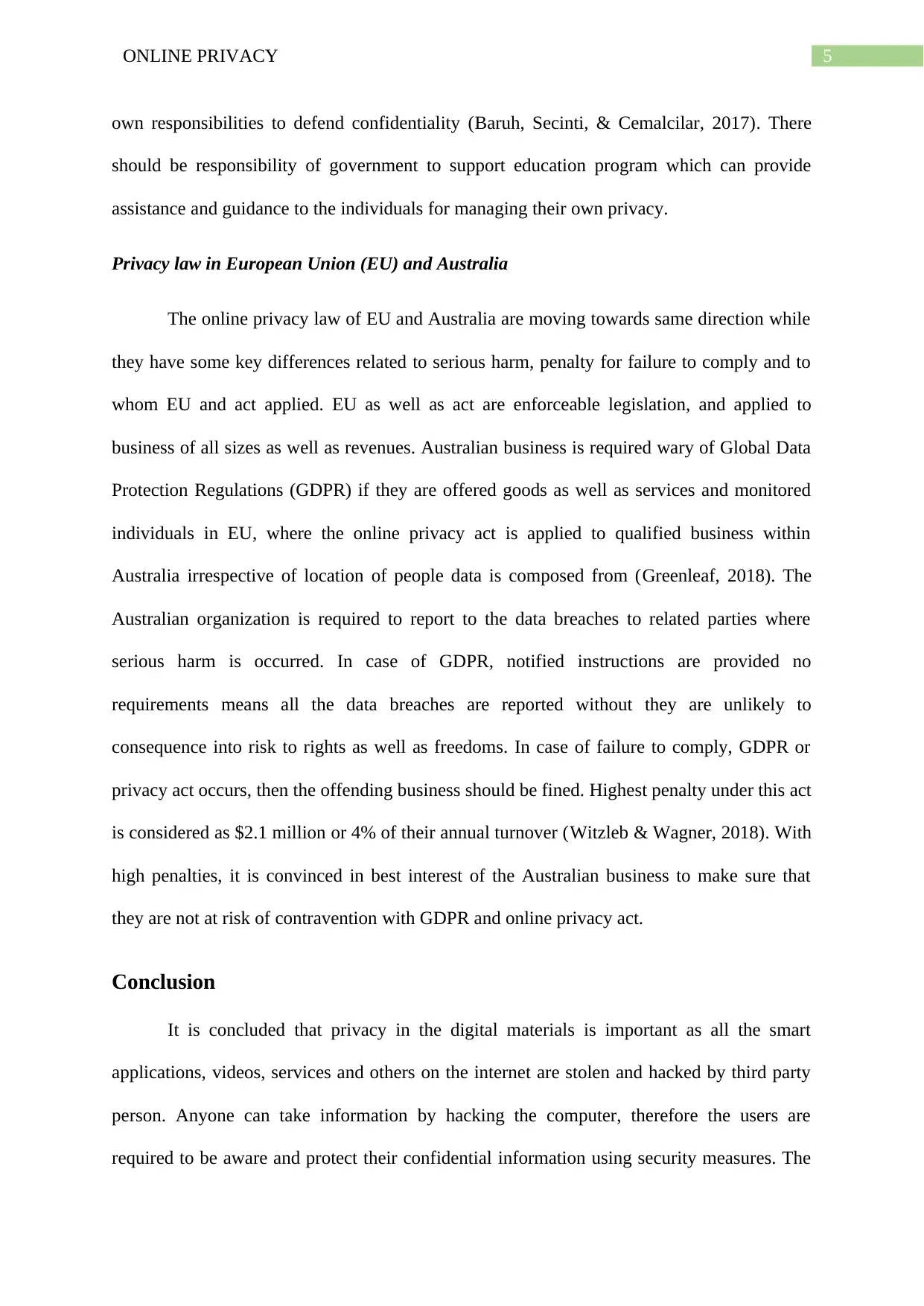
5ONLINE PRIVACY
own responsibilities to defend confidentiality (Baruh, Secinti, & Cemalcilar, 2017). There
should be responsibility of government to support education program which can provide
assistance and guidance to the individuals for managing their own privacy.
Privacy law in European Union (EU) and Australia
The online privacy law of EU and Australia are moving towards same direction while
they have some key differences related to serious harm, penalty for failure to comply and to
whom EU and act applied. EU as well as act are enforceable legislation, and applied to
business of all sizes as well as revenues. Australian business is required wary of Global Data
Protection Regulations (GDPR) if they are offered goods as well as services and monitored
individuals in EU, where the online privacy act is applied to qualified business within
Australia irrespective of location of people data is composed from (Greenleaf, 2018). The
Australian organization is required to report to the data breaches to related parties where
serious harm is occurred. In case of GDPR, notified instructions are provided no
requirements means all the data breaches are reported without they are unlikely to
consequence into risk to rights as well as freedoms. In case of failure to comply, GDPR or
privacy act occurs, then the offending business should be fined. Highest penalty under this act
is considered as $2.1 million or 4% of their annual turnover (Witzleb & Wagner, 2018). With
high penalties, it is convinced in best interest of the Australian business to make sure that
they are not at risk of contravention with GDPR and online privacy act.
Conclusion
It is concluded that privacy in the digital materials is important as all the smart
applications, videos, services and others on the internet are stolen and hacked by third party
person. Anyone can take information by hacking the computer, therefore the users are
required to be aware and protect their confidential information using security measures. The
own responsibilities to defend confidentiality (Baruh, Secinti, & Cemalcilar, 2017). There
should be responsibility of government to support education program which can provide
assistance and guidance to the individuals for managing their own privacy.
Privacy law in European Union (EU) and Australia
The online privacy law of EU and Australia are moving towards same direction while
they have some key differences related to serious harm, penalty for failure to comply and to
whom EU and act applied. EU as well as act are enforceable legislation, and applied to
business of all sizes as well as revenues. Australian business is required wary of Global Data
Protection Regulations (GDPR) if they are offered goods as well as services and monitored
individuals in EU, where the online privacy act is applied to qualified business within
Australia irrespective of location of people data is composed from (Greenleaf, 2018). The
Australian organization is required to report to the data breaches to related parties where
serious harm is occurred. In case of GDPR, notified instructions are provided no
requirements means all the data breaches are reported without they are unlikely to
consequence into risk to rights as well as freedoms. In case of failure to comply, GDPR or
privacy act occurs, then the offending business should be fined. Highest penalty under this act
is considered as $2.1 million or 4% of their annual turnover (Witzleb & Wagner, 2018). With
high penalties, it is convinced in best interest of the Australian business to make sure that
they are not at risk of contravention with GDPR and online privacy act.
Conclusion
It is concluded that privacy in the digital materials is important as all the smart
applications, videos, services and others on the internet are stolen and hacked by third party
person. Anyone can take information by hacking the computer, therefore the users are
required to be aware and protect their confidential information using security measures. The
⊘ This is a preview!⊘
Do you want full access?
Subscribe today to unlock all pages.

Trusted by 1+ million students worldwide
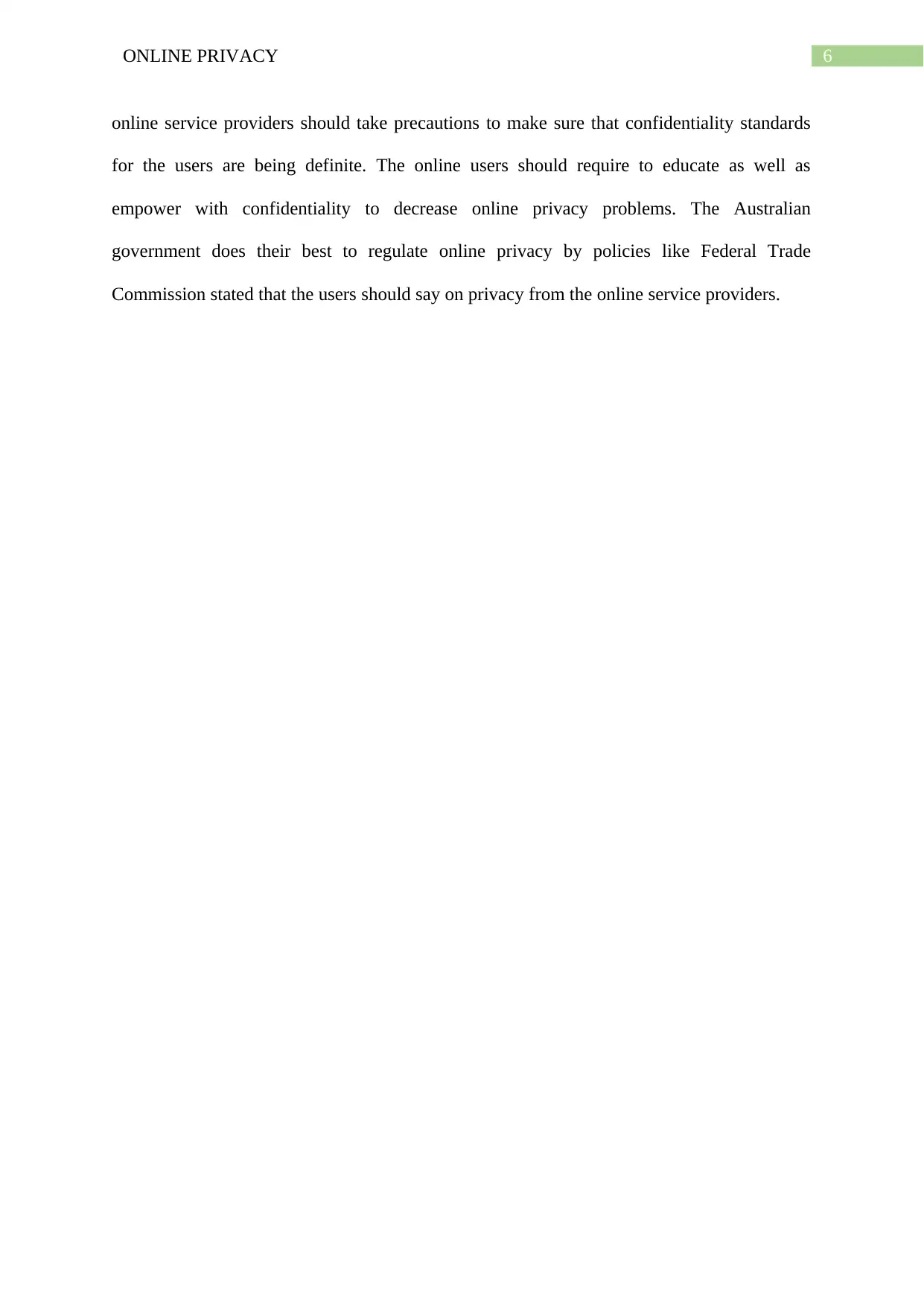
6ONLINE PRIVACY
online service providers should take precautions to make sure that confidentiality standards
for the users are being definite. The online users should require to educate as well as
empower with confidentiality to decrease online privacy problems. The Australian
government does their best to regulate online privacy by policies like Federal Trade
Commission stated that the users should say on privacy from the online service providers.
online service providers should take precautions to make sure that confidentiality standards
for the users are being definite. The online users should require to educate as well as
empower with confidentiality to decrease online privacy problems. The Australian
government does their best to regulate online privacy by policies like Federal Trade
Commission stated that the users should say on privacy from the online service providers.
Paraphrase This Document
Need a fresh take? Get an instant paraphrase of this document with our AI Paraphraser
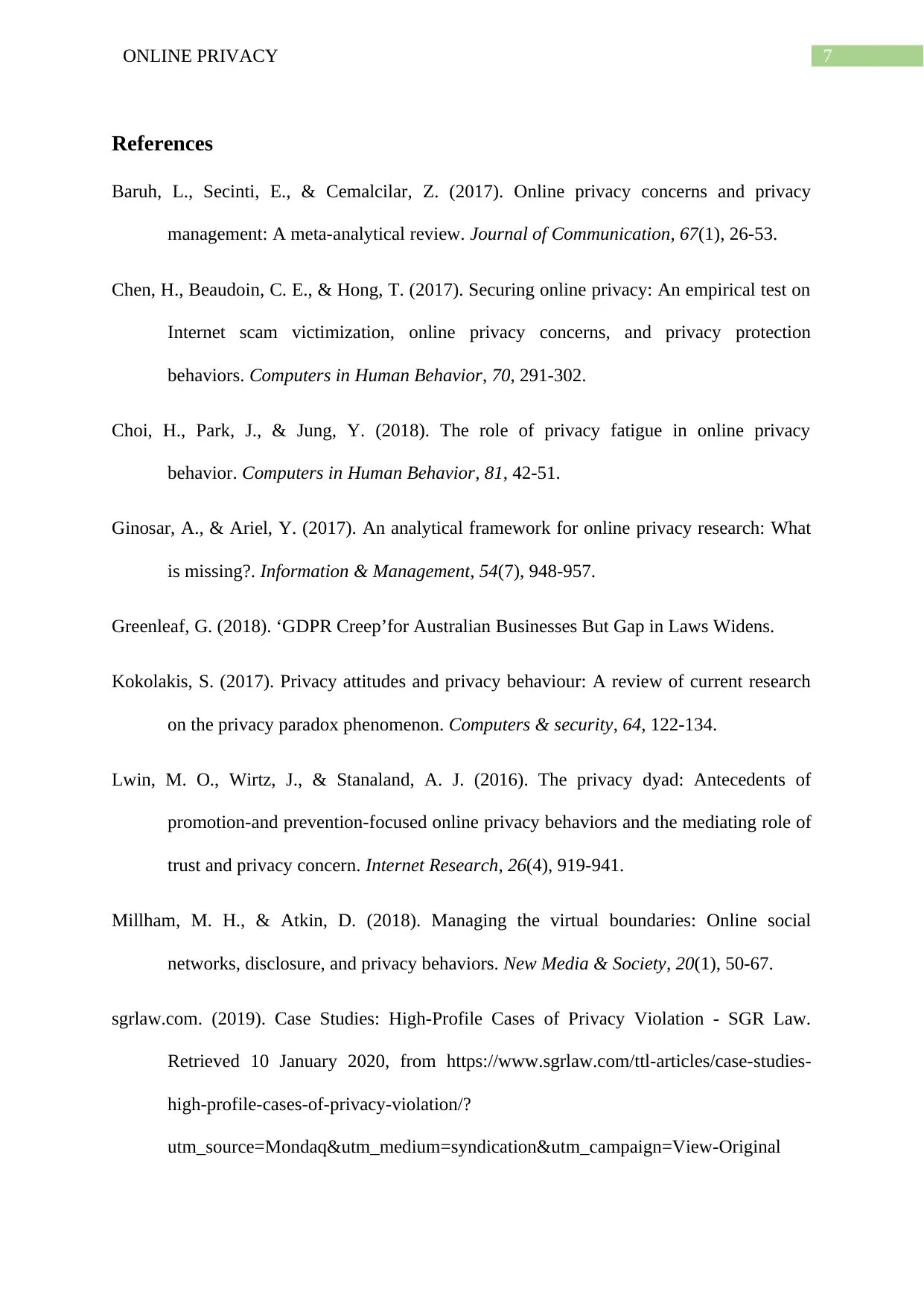
7ONLINE PRIVACY
References
Baruh, L., Secinti, E., & Cemalcilar, Z. (2017). Online privacy concerns and privacy
management: A meta-analytical review. Journal of Communication, 67(1), 26-53.
Chen, H., Beaudoin, C. E., & Hong, T. (2017). Securing online privacy: An empirical test on
Internet scam victimization, online privacy concerns, and privacy protection
behaviors. Computers in Human Behavior, 70, 291-302.
Choi, H., Park, J., & Jung, Y. (2018). The role of privacy fatigue in online privacy
behavior. Computers in Human Behavior, 81, 42-51.
Ginosar, A., & Ariel, Y. (2017). An analytical framework for online privacy research: What
is missing?. Information & Management, 54(7), 948-957.
Greenleaf, G. (2018). ‘GDPR Creep’for Australian Businesses But Gap in Laws Widens.
Kokolakis, S. (2017). Privacy attitudes and privacy behaviour: A review of current research
on the privacy paradox phenomenon. Computers & security, 64, 122-134.
Lwin, M. O., Wirtz, J., & Stanaland, A. J. (2016). The privacy dyad: Antecedents of
promotion-and prevention-focused online privacy behaviors and the mediating role of
trust and privacy concern. Internet Research, 26(4), 919-941.
Millham, M. H., & Atkin, D. (2018). Managing the virtual boundaries: Online social
networks, disclosure, and privacy behaviors. New Media & Society, 20(1), 50-67.
sgrlaw.com. (2019). Case Studies: High-Profile Cases of Privacy Violation - SGR Law.
Retrieved 10 January 2020, from https://www.sgrlaw.com/ttl-articles/case-studies-
high-profile-cases-of-privacy-violation/?
utm_source=Mondaq&utm_medium=syndication&utm_campaign=View-Original
References
Baruh, L., Secinti, E., & Cemalcilar, Z. (2017). Online privacy concerns and privacy
management: A meta-analytical review. Journal of Communication, 67(1), 26-53.
Chen, H., Beaudoin, C. E., & Hong, T. (2017). Securing online privacy: An empirical test on
Internet scam victimization, online privacy concerns, and privacy protection
behaviors. Computers in Human Behavior, 70, 291-302.
Choi, H., Park, J., & Jung, Y. (2018). The role of privacy fatigue in online privacy
behavior. Computers in Human Behavior, 81, 42-51.
Ginosar, A., & Ariel, Y. (2017). An analytical framework for online privacy research: What
is missing?. Information & Management, 54(7), 948-957.
Greenleaf, G. (2018). ‘GDPR Creep’for Australian Businesses But Gap in Laws Widens.
Kokolakis, S. (2017). Privacy attitudes and privacy behaviour: A review of current research
on the privacy paradox phenomenon. Computers & security, 64, 122-134.
Lwin, M. O., Wirtz, J., & Stanaland, A. J. (2016). The privacy dyad: Antecedents of
promotion-and prevention-focused online privacy behaviors and the mediating role of
trust and privacy concern. Internet Research, 26(4), 919-941.
Millham, M. H., & Atkin, D. (2018). Managing the virtual boundaries: Online social
networks, disclosure, and privacy behaviors. New Media & Society, 20(1), 50-67.
sgrlaw.com. (2019). Case Studies: High-Profile Cases of Privacy Violation - SGR Law.
Retrieved 10 January 2020, from https://www.sgrlaw.com/ttl-articles/case-studies-
high-profile-cases-of-privacy-violation/?
utm_source=Mondaq&utm_medium=syndication&utm_campaign=View-Original
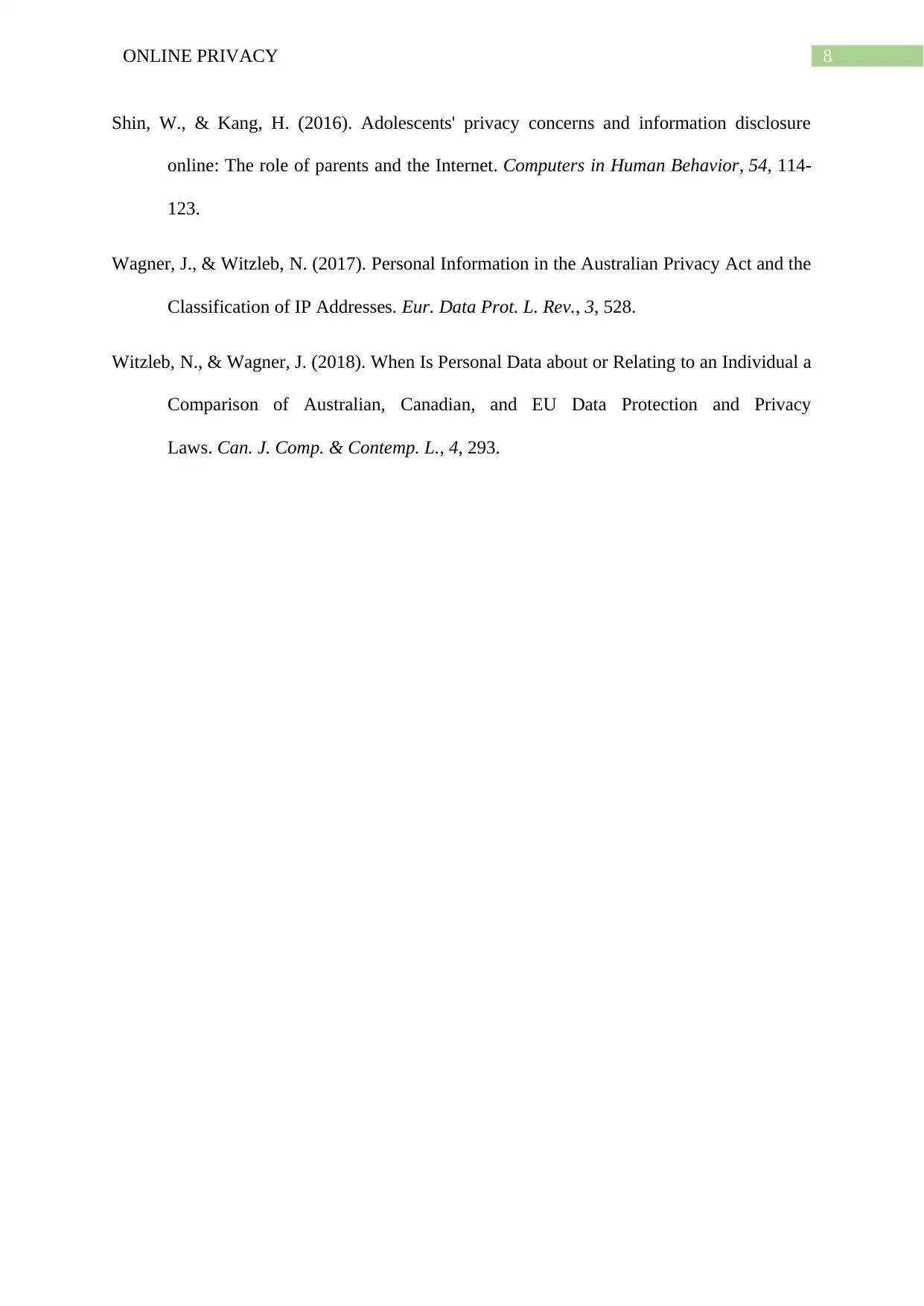
8ONLINE PRIVACY
Shin, W., & Kang, H. (2016). Adolescents' privacy concerns and information disclosure
online: The role of parents and the Internet. Computers in Human Behavior, 54, 114-
123.
Wagner, J., & Witzleb, N. (2017). Personal Information in the Australian Privacy Act and the
Classification of IP Addresses. Eur. Data Prot. L. Rev., 3, 528.
Witzleb, N., & Wagner, J. (2018). When Is Personal Data about or Relating to an Individual a
Comparison of Australian, Canadian, and EU Data Protection and Privacy
Laws. Can. J. Comp. & Contemp. L., 4, 293.
Shin, W., & Kang, H. (2016). Adolescents' privacy concerns and information disclosure
online: The role of parents and the Internet. Computers in Human Behavior, 54, 114-
123.
Wagner, J., & Witzleb, N. (2017). Personal Information in the Australian Privacy Act and the
Classification of IP Addresses. Eur. Data Prot. L. Rev., 3, 528.
Witzleb, N., & Wagner, J. (2018). When Is Personal Data about or Relating to an Individual a
Comparison of Australian, Canadian, and EU Data Protection and Privacy
Laws. Can. J. Comp. & Contemp. L., 4, 293.
⊘ This is a preview!⊘
Do you want full access?
Subscribe today to unlock all pages.

Trusted by 1+ million students worldwide
1 out of 9
Related Documents
Your All-in-One AI-Powered Toolkit for Academic Success.
+13062052269
info@desklib.com
Available 24*7 on WhatsApp / Email
![[object Object]](/_next/static/media/star-bottom.7253800d.svg)
Unlock your academic potential
Copyright © 2020–2026 A2Z Services. All Rights Reserved. Developed and managed by ZUCOL.





